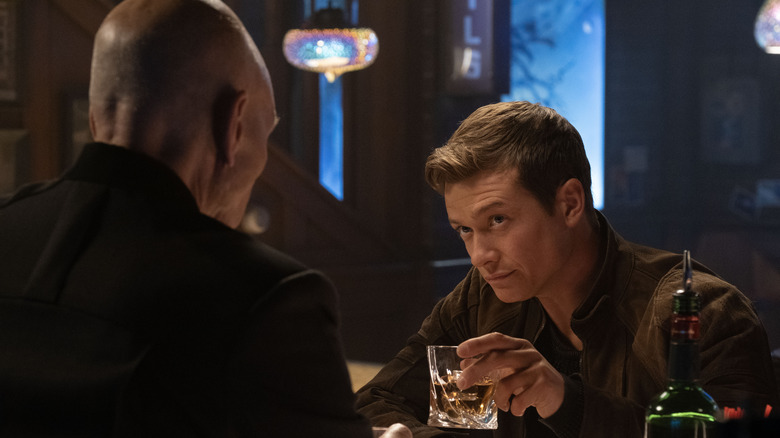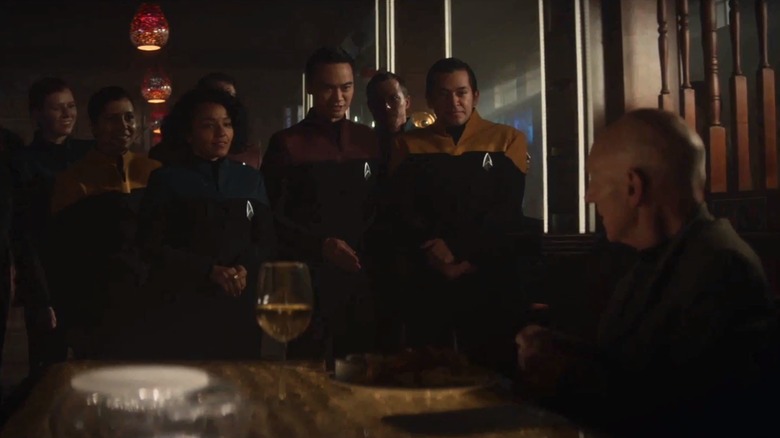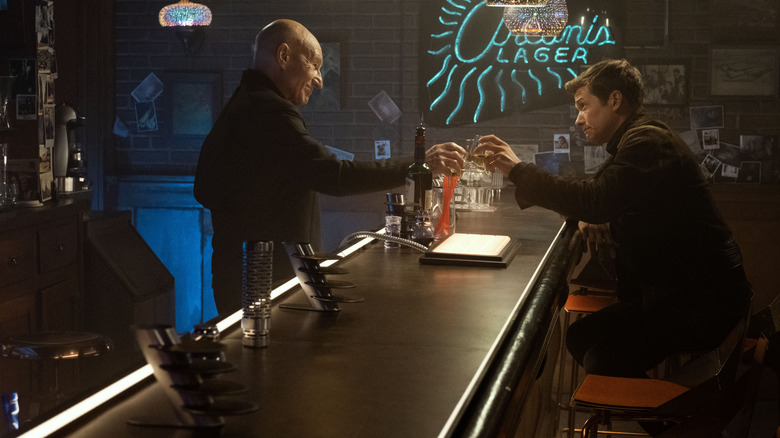The Average Star Trek Episode Is The Most Amazing Story Ever For A Starfleet Cadet In Picard Season 3
This article contains spoilers for the latest episode of "Star Trek: Picard."
Whenever a beloved fictional character receives a story continuation taking place decades later, there's often a stubbornness among diehard fans that these heroes never change or progress in the long years since we last saw them. As a result, legacy sequels tend to resemble shameless nostalgia tours with the aged heroes all but frozen in amber, constantly referencing the past in awed tones and with no shortage of reverence for a character's (or franchise's) "greatest hits."
The early seasons of "Star Trek: Picard" struggled mightily to find a way to balance its ode to the past with its need to tell a story that moves Jean-Luc Picard (Patrick Stewart) forward. And when news first hit that season 3 would turn into an all-hands-on-deck "Star Trek: The Next Generation" reunion special, even some of the biggest fans had to raise a skeptical eyebrow that this storyline, led by showrunner (and "Star Trek" super-fan) Terry Matalas, would be able to thread that needle. But four episodes into the third and final season, it's abundantly clear that "Picard" knows exactly how to have its cake and eat it, too.
After last week concluded in stunning fashion with the reveal of returning Changelings indicating that the Dominion War may not be entirely over, episode 4 begins in the recent past. While enjoying a solitary meal at a bar in San Francisco, Picard is approached by a group of young Starfleet cadets. They're obviously looking for some war stories from the good ol' days, which the admiral is happy to oblige with some deep-cut references. But more importantly, this scene adds a welcome sense of perspective to the show's relationship with the weight of Picard's past.
Taking the kids to school
Inspiration and optimism for the future have remained core tenets of "Trek" since its earliest inception, so naturally "Picard" takes a moment to reflect on how Picard's previous adventures from "The Next Generation" would continue to affect, well, the younger generations that have come next.
No stranger to delivering stirring monologues and motivational words to wide-eyed audiences, Picard initially feigns disinterest before happily launching into memories of his past. We get a taste of dangerous feats of daring and narrow escapes that we never saw, such as his apparent encounter with the alien species known as the Hirogen (introduced after the conclusion of Picard's adventures and in a completely different quadrant of the galaxy altogether in "Star Trek: Voyager") and his "No win scenario" with longtime friend Jack Crusher early on in their Starfleet career. Later on, we even get regaled with Picard's recollections of the famous Tamarian incident, as seen in the classic "The Next Generation" episode titled "Darmok," which featured Picard and an alien captain trapped on a planet and unable to communicate with one another — except through nearly impenetrable forms of metaphor.
All throughout this interaction, we get to witness how "Picard" shifts perspectives from its title character's experienced and well-worn older years to reflect on how the episodes and moments of the past — some of which we may have taken for granted — continue to blow the minds of adoring cadets too young to witness the events themselves. Although the episode purposefully undercuts these triumphs at points (such as directly cutting from Picard's ending soliloquy about finding hope in dire situations in the past to their tragic circumstances in a failing ship in the present), it successfully hones in on why those past experiences still matter.
A very different audience
One of the strengths of the episode, appropriately titled "No Win Scenario," comes from the juxtaposition of Picard's hero-worship in the past and his interactions with his son, Jack (Ed Speleers), in the present.
Seeking refuge from impending death in the comfort of a holographic barroom simulation, the father and son's heart-to-heart is interrupted by a cadre of starship officers who had very much the same idea. During their conversation in the increasingly funeral-like atmosphere, Picard opens up and reaches out to his estranged son by reliving the aforementioned no win scenario. Whatever intentions Picard hoped this success story may have, however, curdles immediately once the bitter and jaded Captain Shaw (Todd Stashwick) limps in and spews venom at Picard for his role in helping the villainous Borg destroy an entire Starfleet armada while assimilated. Shaw only barely survived that disaster by the luck of the draw, helping explain his antagonism towards our hero in one of the episode's finest moments — all while the crew looks on.
But the true gut-punch is still to come.
After the crew of the Titan manage to escape certain death, we revisit Picard and his audience of eager cadets as he finishes with a speech about the importance of a reliable crew. But then a voice in the background speaks up. Young Jack was present, too, testing the waters about Picard's life outside Starfleet before introducing himself. But Picard waxes poetic about Starfleet as the only family he needs and unknowingly shuts down his own son, chasing him away. Unconditional romanticizing of the past, "Picard" seems to argue, comes at a cost. As amazing as Picard's stories are, it's what he does now that matters most.
New episodes of "Star Trek: Picard" stream on Paramount+ every Thursday.


